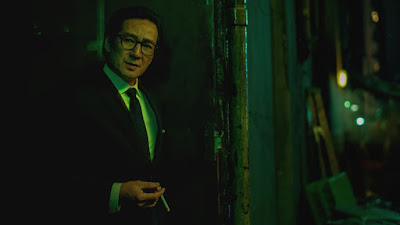The Daniels, a director duo who cut their teeth on music videos before transitioning into film with Swiss Army Man (2016), have an interesting ability where they are able to embed meaningful philosophical explorations in some of the most outlandish concepts ever. Their humor is profane, some might even say immature, but it is admirable that they embrace silliness in a time where many choose to be cynical. Everything Everywhere All at Once (2022) is a high concept sci-fi extravaganza where no idea is too weird, and every drop of creativity is splashed onto the screen for the audience to marvel over. It could be argued that perhaps it is "too much" but the title of the film itself should be a huge indicator of what kind of experience to expect.
Everything Everywhere All at Once is centered around Evelyn Wang (Micelle Yeoh), a woman who owns a laundromat with her husband Waymond (Ke Huy Quan) that is being audited by the IRS. In addition to this, Evelyn's marriage is in jeopardy, her estranged father is coming to visit, and her daughter Joy (Stephanie Hsu) is tying to get the family to accept her relationship with her girlfriend.
Evelyn is overwhelmed by everything going on in her life, but things get even more complicated when she gets caught up in a multiverse spanning quest to protect all of the different universes from Jobu Tupaki, a force of pure chaos who has the power to experience every multiverse simultaneously and can bend them all to her will.
The main hook of the film is the concept of "verse-jumping" wherein if you have the right technology you can access the abilities of your other selves in different universes. Basically, this is a crash course in quantum physics and the many-worlds theory, but the Daniels are smart enough to not have the characters engage in lengthy exposition dumping--the info is drip fed in an engaging way throughout the first act. Verse-jumping is used as a narrative springboard for some of the wackiest shit ever, to include a world where humans have hotdogs instead of fingers. All of these alternate universes could have used these gags as throwaway jokes (and it still would have worked), but each of them has a smaller arc that has emotional payoff in the third act, and you will be surprised at what has you wiping away tears.
Michelle Yeoh is astounding, effortlessly balancing comedic timing and pathos, sometimes simultaneously. Ke Huy Quan is amazing as well, coming back to film after retiring in 2002, dismayed at the lack of opportunities for Asian actors. He shifts between all the different versions of himself seamlessly, running a gamut of emotions, and I hope to see more of him in future works. Stephanie Hsu tackles her dual role with gusto, relishing in being over-the-top, but also excelling at being vulnerable. Every member of the cast contributes to a wonderful synergy that is palpable.
At the heart of this film, it is about finding balance and meaning in a world that is based on chaos, and focusing on the people who care about you, those ones close to your sphere of influence. Jobu Tupaki represents intense nihilism, something the younger generations have embraced, perhaps unconsciously, as the world offers less opportunities for us, and lots more challenges that didn't used to exist. We have become incredibly self aware and unable to accept sincerity without tempering it with cynicism and irony. The Daniels' films seek to counteract this by saying "Look at all this goofy fun stuff, it's okay to let go and laugh, to have wonder, to let go of your insecurities." In this way, after they disarm the audience, they hit them with philosophy and the human condition.




